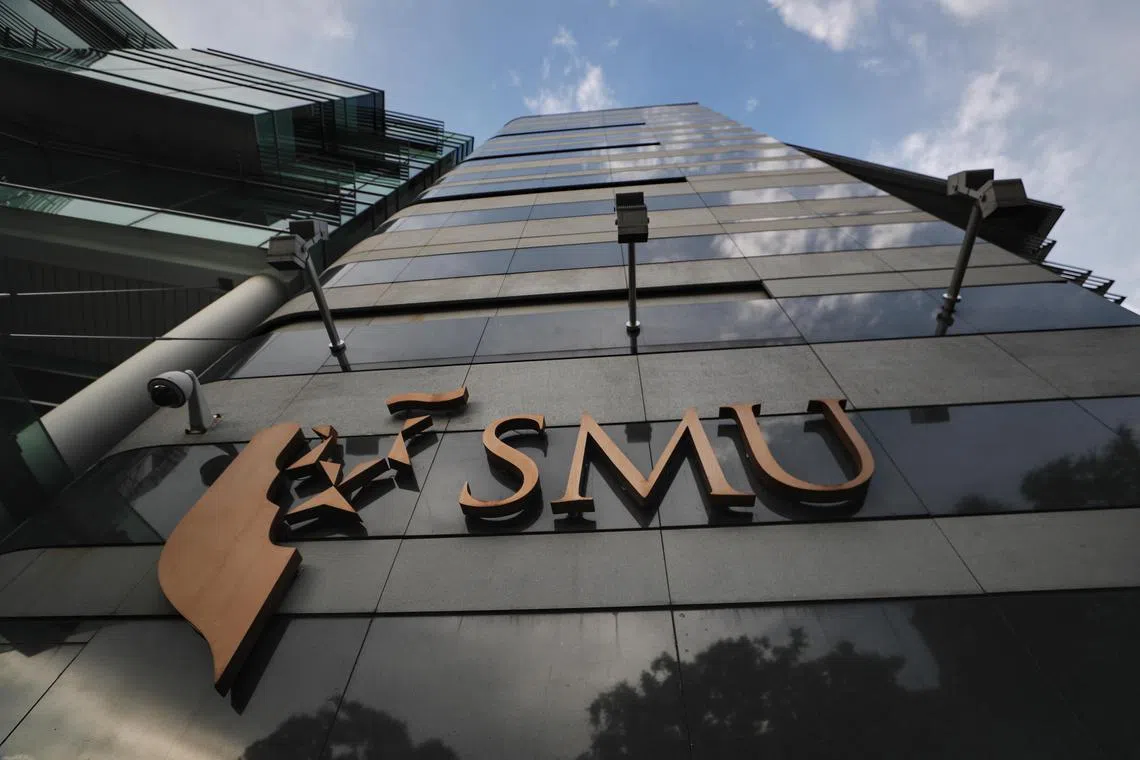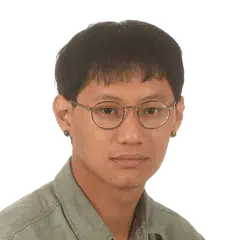All SMU undergrads to take a sustainability module from 2023, take one course in the field from 2024
The third of a four-part series on higher education’s role in building a sustainable and resilient future, Ng Wei Kai talks to SMU’s Timothy Clark on universities can and must to do arm students with the skills to work in sustainability.
Sign up now: Get tips on how to help your child succeed

This is part of an effort to prepare students for jobs that do not exist yet, but could enter the growing field.
ST PHOTO: KELVIN CHNG
SINGAPORE - All incoming undergraduates at Singapore Management University (SMU) from 2023 will get a foundational understanding of sustainability issues.
This move will be expanded in 2024 to require all incoming undergraduates to attain an intermediate mastery of sustainability before graduation by completing at least one course in the field.
This is part of an effort to prepare students for jobs that do not yet exist but could enter the growing field. This effort has become the business of higher education institutions everywhere, said provost Timothy Clark in an interview with The Straits Times in February.
What these future jobs will look like or require is unclear, but SMU is not leaving the development of necessary skills to chance, said Professor Clark, outlining how universities can build a talent pipeline for the emerging “green economy”.
“There isn’t necessarily a clear career path or job opportunities in all aspects of the green economy, which can make it quite difficult to prepare students for particular industries or particular occupations,” said Prof Clark.
“These jobs are still developing – the role of chief sustainability officer is a very recent introduction in many companies... the career paths and job opportunities are themselves emergent.”
To train students for these roles, a close relationship with the industry is crucial, he said.
“We are a very engaged university. Our city location enables us to be a very porous, open community with industry.
“What we’re doing essentially is building relationships with key organisations and industries to learn how these skill sets are emerging and then translating them into our programmes.”
How does SMU figure out what skills the future will need?
The green economy is set to grow very significantly over the coming years, both in Singapore and the rest of the world, said Prof Clark.
And so there will be many new job opportunities for students as well as new skills that they need to develop in order to be able to take advantage of them, he added.
The numbers bear this out. A report released by SkillsFuture Singapore in 2022 found that demand for workers with skills in the digital, green and caregiving spheres has surged
Skills related to sustainability came in hot. Demand for skills in green facilities management grew 23 times, while demand for sustainable investment management increased by 15.5 times.
Another 2022 report by consultancy Bain & Company and investment firm Temasek found that green investment has picked up regionally, with South-east Asia getting US$15 billion (S$20 billion) in cumulative investments since 2020, with the majority going to renewables and the built environment.
The report also found that entrepreneurial efforts are focusing on building and scaling sustainable solutions, especially in the energy and agri-food sectors.
But identifying the specific skills students will need to take advantage of this growth is the challenge facing educational institutions, especially given the rapid pace of development in the area, which can quickly render skills and knowledge obsolete.
Businesses can tell the university what skills they require graduates to possess.
Said Prof Clark: “We talk to them frequently to understand how they’re developing, what their sense of critical skills is.
“And we work with them in terms of internships so that our students can build understanding early on.”
This understanding also feeds back into the university, where lecturers use it to design their courses appropriately and make sure that they are keeping abreast of changes that dictate the skills required in different industries.
Prof Clark said: “If you look at something like the Singapore Green Finance Centre, for example, that’s about working with a range of financial institutions to understand the issues they’re facing and develop programmes accordingly.
“And so it’s through these relationships that we can translate industry needs into our courses, and we have a whole range of relationships that enable us to do that.”
The Singapore Green Finance Centre opened in 2020 as a collaboration between Imperial College Business School and SMU’s Lee Kong Chian School of Business in climate science, financial economics and sustainable investing.
The centre is supported by the Monetary Authority of Singapore and nine founding partners: Bank of China, BNP Paribas, Fullerton Fund Management, Goldman Sachs, HSBC, Schroders, Standard Chartered Bank, Sumitomo Mitsui Banking Corporation, and UBS Group.
How are those skills delivered to students?
After figuring out what skills the green economy will need, the next step is to get them to students.
“Our key motivation in relation to our education is to produce future-ready students who will be work ready,” said Prof Clark.
To do this, SMU in 2019 launched Singapore’s first sustainability undergraduate major.
Offered as a second major, it aims to develop graduates who have knowledge and skills to implement sustainable practices in business, said Prof Clark.
“Another critical initiative is having a university-wide sustainability education framework for all undergraduate students,” he said.
“Our aim is that from 2023, all of our students will have a foundational mastery of sustainability issues.”
All students will be equipped with an understanding of how to respond to sustainability challenges, he said, elaborating on plans to beef up the university’s sustainability curriculum across the board.
That entails taking a freshman module in the field.
Prof Clark added that from 2024, first-year undergraduates will be given what SMU calls an intermediate mastery of sustainability.
“We will have a system where there is a sustainability graduation requirement and all students will have to meet the requirement. One way to do so is to read at least one course on sustainability as part of their studies.”
SMU is also trying out a variety of strategies which vary from the traditional four-year degree in one or two subjects, including bespoke degrees and work-study programmes.
To help students come out of university with the most up-to-date skills, SMU in 2022 set up a College of Integrative Studies,
Prof Clark said: “Fundamentally, its purpose is to offer a very flexible approach to a major. One of the key motivating factors behind developing and launching that college was jobs that aren’t necessarily there, that are emerging as they enter their studies.
“(The flexibility) enables them to align their skill sets to emergent areas... Essentially, they curate their own courses to develop a bespoke major.”
SMU also focuses on giving students on-the-job training, he said. It is compulsory for every student to complete an internship before graduating.
But on top of that, SMU also offers work-study courses, programmes and degrees.
Prof Clark said: “If they’re doing a work-study course, for example, students are spending four days a week in a company, one day a week on campus... We’re providing many different opportunities for students to have a real-world job experience.”
Moving at speed and getting to adult learners
Complementing SMU’s undergraduate efforts is its professional and adult education arm SMU Academy, which the university hopes to introduce to its students while they are still studying full-time.
Prof Clark said: “How to create lifelong learners, I would say that’s something that all universities in Singapore are putting considerable emphasis on.
“It’s something we are developing. We have our academy and we offer courses to our students in the academy. But what we want essentially is to inculcate into our students, while they’re studying with us, the importance of continuing to learn.”
The university offers its full-time students free taster courses with the academy and keeps in contact with its alumni to understand what courses they may need as they advance in their careers.
The academy, which offers several thousand courses of varying lengths, is an agile organisation that is able to “move at speed”, said Prof Clark.
“We have a range of postgraduate professional programmes that we offer our students and we have green skills built into those programmes – for example, sustainable finance.”
In other words, the academy aims to deliver courses to upskill Singaporeans through lifelong learning.
Tackling sustainability will take more than hard science
While SMU does not focus on the hard science behind sustainability, its expertise in areas such as finance is just as necessary to tackle complex issues like climate change.
Said Prof Clark: “If you take something like recycling – and Singapore is rolling out a very significant recycling programme right now – a lot of this requires people to change their behaviour. And this requires us to understand how people make decisions.”
There are financial aspects to sustainability, as well as how companies build their visions, missions and strategies, make decisions, motivate their staff, compete and understand the competition in their marketplaces, he said.
All of these skills are developed at a university like SMU, he added.
“So it’s one thing to have the technology. It’s another thing to then know how to market that technology, how to build a market for that technology, how to build relationships and how to collaborate.
“So you can have the best technology. But I would argue that it’s these skill sets and knowledge areas that will actually determine your success.”
About Timothy Clark
Professor Timothy Clark has been provost of SMU since April 1, 2019. In his role, Prof Clark has undertaken a range of initiatives aimed at enhancing the distinctive DNA of SMU’s education and the impact of its research.
These have included launching new work-study programmes with prestigious partners like Google and SingHealth, expanding the innovative SMU-X pedagogy, increasing international learning opportunities by developing new partnerships with overseas universities to deliver courses jointly, expanding digital learning and extending the core curriculum courses.
Under Prof Clark’s leadership the university has launched a number of significant research initiatives including its Centre on Research for Successful Ageing (ROSA) and the Singapore Green Finance Centre, a collaboration with Imperial College London.
Prior to joining SMU, Prof Clark was Pro-Vice-Chancellor (Social Sciences and Health) at Durham University, United Kingdom.
Prof Clark is a former general editor of Journal of Management Studies and was both the chair and president of British Academy of Management.
He is a fellow of the British Academy of Management and the Academy of Social Sciences.



